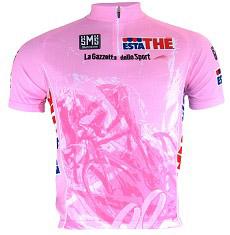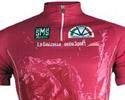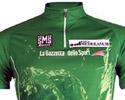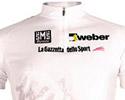
Recently on Cyclingnews.com |
Giro news feature, May 18, 2007
Giro d'Italia classifications demystified
Most seasoned cycling fans have a grasp on the major Tour de France competitions, but the classifications of the Giro d'Italia can leave even the most veteran commentators scratching their heads. With no fewer than eleven separate classifications, it's easy to get confused. Cyclingnews' Laura Weislo and Tim Maloney try to clear up the situation.
Maglia Rosa (Overall Jersey)

|
The pink jersey, otherwise known as the Maglia Rosa, is the most sought after jersey in the Giro d'Italia. Signifying the leader in the general classification, the shirt inspires even the most manly of men to want to wear pink. But why pink? The jersey colour is the signature shade of the sponsoring newspaper, La Gazzetta dello Sport, whose pages are printed on pink paper.
The jerseys is awarded after each stage to the rider with lowest cumulative time. If the top riders are tied exactly on time (for instance, in the team time trial), then the jersey is decided by stage finishes.
Only three men have taken home the final pink jersey five times (Fausto Coppi, Alfredo Binda and Eddy Merckx), and none have won it just four times. However, five are three-time winners (Bernard Hinault, Felice Gimondi, Fiorenzo Magni, Gino Bartali and Giovanni Brunero), and of the 11 two-time victors, two are currently seeking to join the ranks of the hat trick this year: Gilberto Simoni and Paolo Salvodelli.
Maglia Ciclamino (Sprinter's Jersey)

|
The Maglia Ciclamino derives its name from the Cyclamen flower, which has a purple color. Similar to the Tour de France green jersey, the Maglia Ciclamino is the domain of the sprinters, and is determined by points earned on the finishing line of each day's stage. The rider with the most consistent finishes throughout the race is awarded with the final purple jersey.
The classification is determined by stage finishes which are scored 25 for first, 20 for second, and then 18, 14, 12, 10, 9, 8, 7, 6, 5, 4, 3, 2, and 1. The points for the T.V. Garibaldi sprints also factor into this competition down to six places at 8 points for first, 6, 4, 3, 2, and 1 for second through sixth.
The maglia ciclamino doesn't always go to the pure sprinters, however, and because the points are the same for mountain top finishes and flat stages alike, the parcours can determine who takes the final prize home.
Paolo Bettini, able to place well both in flat bunch sprints and shorter uphill finales won the past two points competitions. Fast man Alessandro Petacchi sprinted into the record books in 2004, taking out a record nine stages in a single Giro d'Italia. While Petacchi won six stages in 2003, climber Gilberto Simoni took home the purple shirt after Ale-Jet missed the time cut on a particularly brutal stage 18 and was eliminated from the race.
Maglia Verde (Climber's Jersey)

|
Unlike the Tour de France, the climber's jersey in the Tour of Italy doesn't have any of those gaudy polka dots. Instead, it's a subdued green, like the verdant hills of Tuscany or the forested Dolomiti. The climber's jersey is determined by points accumulated at the top of each classified climb along the route.
Bigger mountains earn a rider more points, and the rider having the most accumulated points is awarded the jersey at the end of each stage. Category 3 climbs have three places (3, 2, 1), category 2 also have three (5, 3, 1), category 1 have five scoring places (10, 6, 4, 2, 1) and finally the highest point in the Giro (this year the Colle dellAgnello) has six places (20, 15, 12, 10, 6, 4 and 2 points).
The jersey, obviously, isn't given out until after the first stage containing a classified climb, and in this year's Giro, that didn't happen until stage two.
Similar to the Tour de France climber's jersey, the maglia verde favours the rider who isn't afraid to go on a suicidal breakaway on the most torturous stages of the race. Diminutive rides from South and Central America have dominated in recent years, with Venezuela's Josι Rujano taking home the green jersey in 2005, Fredy Gonzαlez (Columbia) winning the mountains classification in both 2003 and 2001, and Julio Pιrez carrying his snaggle-toothed grimace to the top of the competition in 2002.
Maglia Bianca (Young rider's jersey)

|
This is the one competition where the Tour and the Giro share the same color for the same classification. The white jersey, or maglia bianca, is given to the rider under the age of 25 who is highest in the overall classification at the end of each stage.
Last won by Evgeni Berzin in 1994, the white jersey was re-introduced this year after a 12 year hiatus.
T.V. Garibaldi
Once upon a time there was a jersey competition called the Intergiro classification. It had a blue jersey, and nobody outside of the race jury could figure out exactly how it was awarded. After 18 years of baffling the public, the Giro d'Italia organisers have simplified the intermediate sprint competition in honour of the 200th anniversary of Guiseppe Garibaldi's birth. The famed Italian general would be proud of the beautiful simplicity of the new competition.
Each stage (except the time trials) has one intermediate sprint for this competition, and the first five across the line receive points - 5,4,3,2,1. The rider with the most accumulated points at the end of the Giro d'Italia will take home the prize, but no jerseys are awarded for the competition this year.
The TV Garibaldi sprint also qualifies toward the overall points classification, or the ciclamino jersey, and is awarded with points down to six places at 8,6,4,3,2,1 points.
Furthermore, these intermediate sprints count towards the 'most combative' competition, so the sprints are very valuable to the riders!
Most combative
The Most Combative classification is not like its counterpart in the Tour de France for example, where riders are awarded points for breaking away and being aggressive during the stage (that doesn't mean hitting people). Instead, it's more like a combination classification, where riders score points for stage finishes, Intergiro sprints, and climbs.
The first six across the finish line receive points (6,5,4,3,2,1) and the first five in the TV Garibaldi receive points (5,4,3,2,1) as well as the top finishers on each classified mountain, depending on the category of the hill. Category 3's rate only two places (2, 1) category 2's get three, (3,2,1) and category 1 and Cima Coppi climbs rate four places (4,3,2,1).
Trofeo Fuga Gilera
The Trofeo Fuga Gilera is more like the traditional Most Combative prize. Riders score points by getting in breakaways (minimum distance: 5 kilometres, maximum size of the group: 10 men). The longer the breakaway, the more points are scored, one for each kilometre in the break.
Azzurri d'Italia
The Azzurri d'Italia classification is similar to the points classification, except that it only awards points for the top three stage finishers (4, 2 and 1 point).
Teams
The Trofeo Super Team is a little different to the timed team classification, in that it awards points to teams for placing a rider in the top 20 in the stage: 20 for first, 19 for second and so on down to 1 point for 20th.
Fair Play
Finally, there is the Fair Play classification for teams. This is one where the more points the team has, the lower they are on the classification. It is scored using six criteria: A warning earns 0.50 points; a fine is worth 1 point for every 10 Swiss francs; a time penalty is worth 2 points per second; a declassification is worth 100 points; a disqualification/explusion is worth 1000 points; and a positive doping control is worth 2000 points.
Prize list
Jersey competitions |
Other competitions |
Stage finish 10,795 5,400 2,700 1,350 1,080 810 810 540 540 270 270 270 270 270 270 270 270 270 270 270 Total 26,995 Maglia Rosa 1 100,000 2 50,000 3 30,000 4-10 1,500 each Each day in maglia rosa: 1,000 Maglia Ciclamino Daily Points prizes 1 800 2 500 3 200 Each day in maglia ciclamino: 500 Final points classification 1 10,000 2 8,000 3 6,000 4 4,000 5 3,000 31,000 31,000 Maglia Verde |
T.V Garibaldi Daily T.V. Garibaldi sprint primes 1 500 2 400 3 300 4 200 5 100 Final T.V. Garibaldi classification 1 10,000 2 8,000 3 6,000 4 5,000 5 3,000 Azzurri d'Italia Final Azzurri d'Italia: 5,000 Fuga Gilera |
